Can Cockatiels Eat Broccoli? Find Out If It’s Safe
Cockatiels are the perfect pets for people who love birds and want a pet that isn’t too demanding to care for. These intelligent, friendly birds can be taught to talk, sing, and even dance.
But, can cockatiels eat broccoli as a pet? Yes! Experts say it can be suitable for any type of bird. Broccoli is rich in vitamins A, C, B12, B6, D, E, and K. These minerals are ideal for your bird’s health. Thus, it’s packed with calcium, so your little buddy has enough calcium running for healthy bones and teeth.
So, how much broccoli should they take each day? Is there a limitation on the amount they should take? Should they consume it raw or cooked? Read on for all the answers about cockatiels and broccoli.
Can Cockatiels Eat Broccoli?
As experts said cockatiel can eat broccoli and it is suitable for their health, you do not need to worry anymore. Moreover, you can read further to know why they can eat broccoli.
1. Broccoli is safe for them
Broccoli is an excellent food for birds, and there are no known side effects or allergies that can be associated with eating it.
2. Cockatiels are herbivores
You’ve probably heard that cockatiels are herbivores. This means they eat plants, like leafy greens and grasses. As Broccoli is definitely a plant, it’s safe for your bird to eat!
Benefits Of Feeding Your Cockatiels With Broccoli
So, what benefits makes your cockatiel gain by feeding on broccoli? Here is an explanation of the good side of having this as part of their diet:
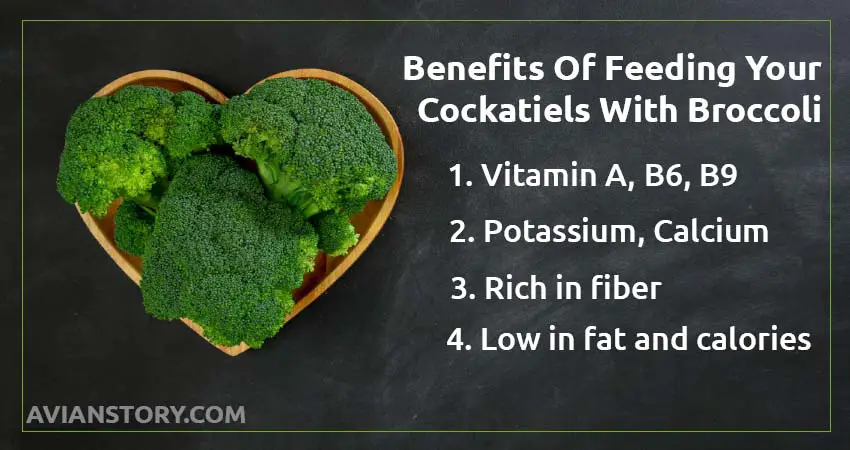
1. Rich in vitamins
Broccoli is rich in vitamins. It contains the following:
- Vitamin A: It is fat-soluble and found in many vegetables like broccoli. It is known as retinol, a group of compounds that are similar to vitamin A.
Vitamin A benefits the health of your cockatiel’s eyes and skin. Vitamin A can help prevent dry eye syndrome, which can cause irritation, inflammation, and can damage the cornea of your cockatiel’s eyes. It also helps improve blood flow by increasing blood vessels in the retina.
- Vitamin B6: Vitamin B6 is an essential vitamin that helps the body metabolize carbohydrates and amino acids. It also aids in the production of red blood cells, aids in reducing stress, and supports the immune system.
Cockatiels need vitamin B6 because it is necessary for many functions within the body. Without it, a cockatiel will suffer from depression and might even die!
- Vitamin B9: Vitamin B9 is also known as folic acid and is found in broccoli and other cruciferous vegetables. It helps form red blood cells, which can help prevent anemia.
This vitamin also helps maintain healthy skin, hair, and nails. If your cockatiel has anemia or other health conditions, adding a supplement containing B9 may be helpful.
- Vitamin B12: Vitamin B12 is one of the most essential vitamins for your cockatiel. It’s important because it helps keep your bird’s mind sharp and active, which is crucial to its health. Vitamin B12 also contributes to the solid and shiny feathers that you want on your bird!
- Vitamin D: Cockatiels need Vitamin D for their bodies to absorb calcium and phosphorus from food. Vitamin D supports healthy egg production during breeding, which means more eggs for your bird.
- Vitamin E: Vitamin E is an essential vitamin that helps your bird maintain a healthy immune system and protects against oxidative stress. It’s also crucial for the proper functioning of your bird’s nervous system, so it must get enough vitamin E daily.
- Vitamin K: Vitamin K is a fat-soluble vitamin that plays several critical roles in cockatiel’s bodies. It is essential in helping them maintain strong bones. Thus, it also helps keep their blood clotting, vital in life-threatening situations.
2. Rich in minerals
Broccoli contains the following minerals:
- Potassium: Potassium is a mineral that your cockatiel needs to stay healthy. It helps with muscle function, blood pressure, and nerve transmission. Potassium also helps with fluid balance and helps prevent kidney stones.
- Calcium: Calcium is a mineral that plays an essential role in the development and maintenance of bones and teeth and the transmission of nerve signals. It also helps to maintain muscle control and contraction, which is essential for birds like your cockatiel.
- Iron: Broccoli is one of the richest sources of iron in the produce aisle. Iron is an essential nutrient that helps your body maintain energy levels and make red blood cells, which carry oxygen throughout your body.
A lack of iron can lead to anemia and fatigue. So it’s essential to provide your cockatiel with a healthy diet with plenty of iron-rich foods like broccoli.
- Phosphorous: This mineral helps ensure your cockatiel’s body is healthy and functioning correctly. Phosphorus is essential for helping your bird’s bones and muscles stay strong, allowing it to remain active and engaged in play.
3. Rich in fiber
Broccoli is a rich source of dietary fiber. This nutrient is essential for good digestive health. This includes helping to maintain a healthy weight and supporting waste movement through your digestive system. Fiber also helps keep your bird feeling full longer, which can help prevent overeating.
4. Low in fat and calories
Broccoli is low in fat and calories, which makes it an ideal choice for your cockatiel. Hence, it’s essential that your pet has a healthy diet, and one of the best ways to do that is to ensure they’re eating foods that are high in nutrients and low in calories.
Risks Of Feeding Your Cockatiel With Broccoli
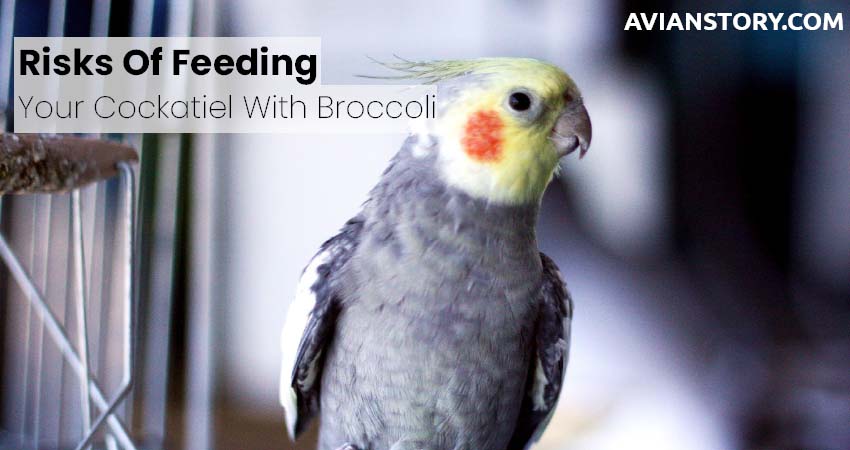
If you’re overfeeding your cockatiel broccoli, it’s critical to watch for oxalic acid. Oxalic acid is the primary metabolite of the salt in broccoli, and it can cause damage to your cockatiel’s urinary tract.
It can also cause them to stop eating and drinking, leading to dehydration. In extreme situations, it could lead to kidney stones.
How Much Broccoli Should You Feed Your Cockatiels?
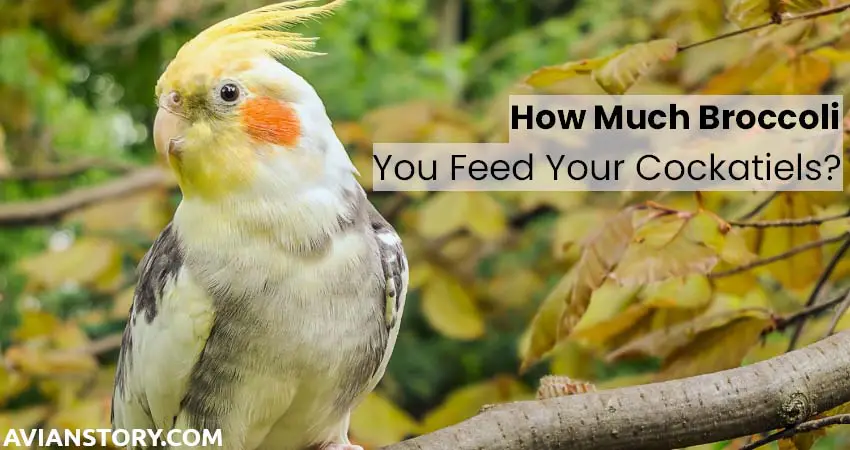
You should feed your birds 30 to 40 grams of food daily; 60% to 80% of that should be seed. They must eat lots of seeds because they’re so high in energy. Without enough energy, your bird won’t be able to fly as well or maintain its body temperature properly.
Likewise, you should give them 5% to 15% vegetables and 5% to 15% fruits. In this case, you can use any vegetable in your mix—broccoli is just one example!
Overall, you can feed your birds any amount of broccoli between 4 and 10 grams daily. We recommend you provide them with broccoli twice or thrice a week and not every day.
Should You Feed Your Cockatiels With Raw Or Cooked Broccoli?
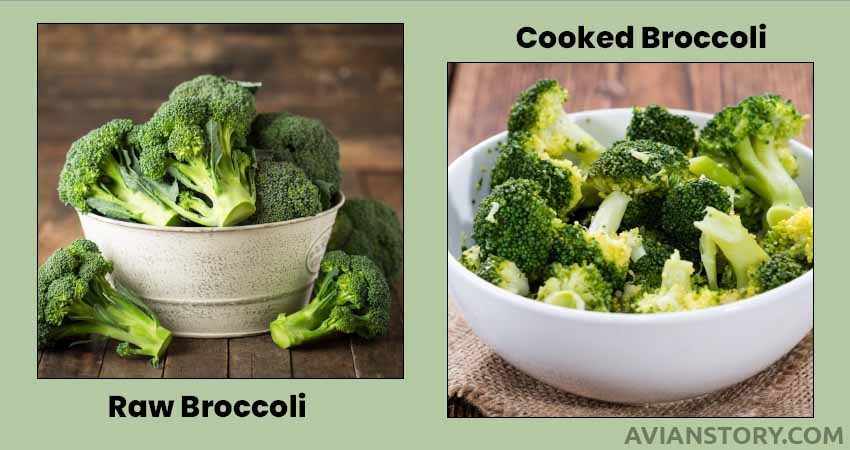
We all know cockatiels are picky about their food, so giving them the best is essential. Cockatiels can feed on any of the following types of broccoli:
- Raw: You’ll want to ensure that you’re giving your cockatiel organic foods whenever possible. You can wash and rinse organic produce before serving it to your cockatiel. The act ensures that they don’t get harmful pesticides on their bodies.
- Steamed or cooked: We recommend steaming broccoli rather than feeding your cockatiels with raw broccoli. Steaming means that you won’t have to worry about any risk of contamination from raw broccoli or other bacteria. And because it’s cooked, it’ll be less likely to cause digestive issues.
- Dried: Dried broccoli has its moisture content removed. The nutrients in the vegetable are still present, so it’s healthy.
What Other Vegetables Can Cockatiels Eat?
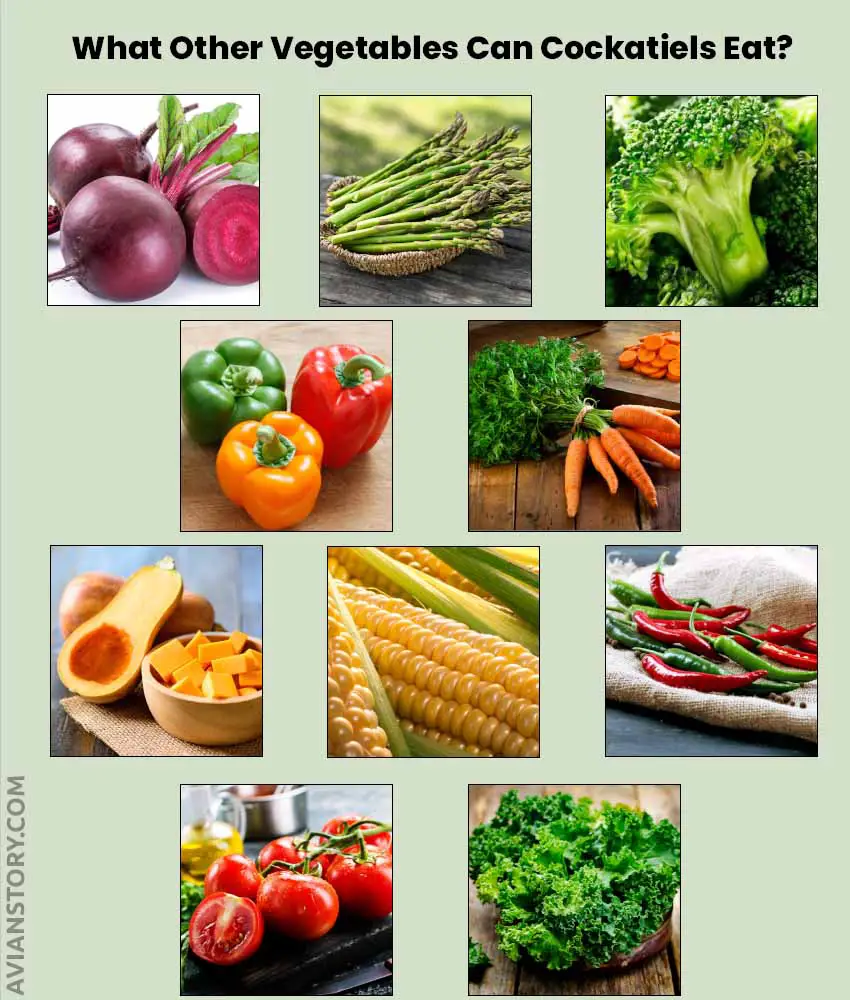
Cockatiels can eat just about any type of vegetable. Still, it’s essential to make sure that any vegetables you give them are healthy for them. They need a balanced diet and should not be given too many vegetables or fruits at once.
Some examples of healthy vegetables that cockatiels can eat include:
- Beets
- Asparagus
- Broccoli
- Pumpkins
- Bell peppers
- Carrots
- Butternut
- Corn-on-the-cob
- Collard greens
- Hot peppers
- Courgettes
- Spinach
- Mustard greens
- Leeks
- Tomatoes
- Dandelion greens
- Winter squashes
- Okra
- Kale
- Parsley
- Sweet potatoes
FAQs
Here are answers to some of the questions you might have regarding broccoli and cockatiels:
What kind of broccoli shouldn’t be fed to cockatiels?
You should avoid other kinds of broccoli with spices or seasonings added to them. These additives may not agree with the bird’s digestive system.
Hence, the best types of broccoli for your cockatiel are those that don’t contain garlic or additives since they are simply plain.
What can’t cockatiels eat?
Cockatiels should never be fed on avocados, eggplants, fruit seeds, or pits. Tomatoes, onions, and mushrooms are a no for cockatiels. You should also avoid raw rhubarb, raw beans, garlic, and all the whole celery sticks.
Conclusion
If you’re looking for vegetable alternatives for your cockatiel, broccoli is a great choice! Broccoli is high in vitamin A, which will help keep your bird’s skin and feathers healthy.
However, be sure to avoid giving your cockatiels spiced and seasoned broccoli.
